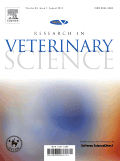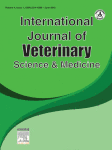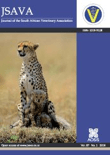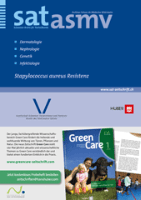
CANADIAN JOURNAL OF VETERINARY RESEARCH-REVUE CANADIENNE DE RECHERCHE VETERINAIRE
Scope & Guideline
Advancing Veterinary Science for a Healthier Tomorrow
Introduction
Aims and Scopes
- Veterinary Microbiology and Infectious Diseases:
Research that explores the microbiomes, pathogens, and infectious diseases affecting various animal species, including studies on antibiotic resistance and vaccine development. - Clinical Veterinary Medicine:
Studies that evaluate diagnostic methods, treatment outcomes, and surgical techniques in companion animals, horses, and livestock, emphasizing the clinical application of research findings. - Animal Welfare and Behavior:
Research focusing on the well-being of animals, including behavioral studies and the effects of management practices on health and welfare. - Translational Research:
Research that bridges laboratory findings with clinical applications, aiming to improve veterinary practices and animal health through innovative therapies and techniques. - Epidemiology and Public Health:
Studies examining the relationship between animal health and public health, including zoonotic diseases and the impact of animal agriculture on human health.
Trending and Emerging
- Microbiome Research:
A growing emphasis on the role of microbiomes in animal health, particularly in companion animals and livestock, is evident. This trend underscores the importance of understanding microbial communities in disease prevention and treatment. - Telemedicine and Remote Diagnostics:
Research exploring the use of telemedicine and remote diagnostic tools has gained traction, likely accelerated by the COVID-19 pandemic, highlighting the need for innovative approaches to veterinary care. - One Health Approach:
An increasing focus on the One Health concept, which integrates human, animal, and environmental health, reflects a broader recognition of interconnected health issues and the need for interdisciplinary research. - Regenerative Medicine and Stem Cell Therapy:
Emerging studies on regenerative medicine, including the use of stem cells for treating various conditions in animals, indicate a trend towards exploring advanced therapeutic options. - Antimicrobial Stewardship:
With rising concerns over antibiotic resistance, there is a notable increase in research dedicated to antimicrobial stewardship practices in veterinary medicine, emphasizing responsible use of antimicrobials.
Declining or Waning
- Traditional Pathology Studies:
Research focusing on traditional histopathological techniques appears to be declining, possibly due to the increased adoption of molecular and genomic approaches that provide more detailed insights into disease mechanisms. - Invasive Surgical Techniques:
There seems to be a waning interest in studies centered on invasive surgical methods, as the field gradually shifts towards less invasive techniques and improved imaging modalities. - Agricultural Veterinary Practices:
Research pertaining to conventional agricultural practices, particularly in livestock management, is decreasing, potentially being replaced by studies focusing on sustainability and welfare-oriented practices.
Similar Journals

Thai Journal of Veterinary Medicine
Championing research for animal welfare and public health.Thai Journal of Veterinary Medicine, published by Chulalongkorn University, serves as a vital resource for researchers, practitioners, and students in the field of veterinary science. With an ISSN of 0125-6491, the journal has been providing a platform for the dissemination of original research and reviews since its inception, with a focus on advancing veterinary practice and animal health in Thailand and the broader Southeast Asian region. The journal is recognized in the Scopus database, currently ranked in the Q4 category for Veterinary (miscellaneous), reflecting its commitment to quality despite being in a highly competitive space. The scope of the journal encompasses a wide array of topics pertinent to veterinary medicine, ensuring accessibility to diverse veterinary disciplines. While the journal currently does not offer an open-access option, it remains dedicated to contributing valuable knowledge and insights to the veterinary community, supporting the improvement of animal welfare and public health initiatives in the region. As it continues to publish until 2024, the Thai Journal of Veterinary Medicine invites contributions that align with its objectives of fostering scholarly discourse and advancing veterinary research.

Slovenian Veterinary Research
Elevating Veterinary Research for a Sustainable FutureSlovenian Veterinary Research, published by the University of Ljubljana, serves as a significant platform for the dissemination of research within the veterinary field. With an ISSN of 1580-4003 and an E-ISSN of 2385-8761, this open-access journal has made its content freely available to the global research community since 2021, enhancing accessibility and engagement. The journal's scope includes a diverse range of topics relevant to veterinary science, aiming to foster innovation and collaboration among researchers, professionals, and students in the field. Although currently categorized in the Q4 quartile for veterinary studies, the journal is committed to improving its impact and visibility, particularly as it converges on its upcoming years of operation from 2007 to 2024. As it strives to elevate its Scopus ranks, currently positioned at rank #162/194 in General Veterinary, Slovenian Veterinary Research provides a vital resource for advancing knowledge and best practices in veterinary medicine. For anyone interested in the latest veterinary research trends and findings emanating from Slovenia and beyond, this journal represents an essential source of information.

Journal of the Hellenic Veterinary Medical Society
Pioneering insights for the future of animal health.Welcome to the Journal of the Hellenic Veterinary Medical Society, a premier platform dedicated to advancing the field of veterinary medicine through high-quality research and scholarly discourse. Published by the Hellenic Veterinary Medical Society, this journal serves as a vital resource for veterinarians, researchers, and students who are committed to the advancement of animal health and welfare. With an ISSN of 1792-2720 and a recognized status in the community, the journal publishes impactful studies that contribute to the understanding of various veterinary disciplines. Although the journal currently sits in Q3 of the Veterinary (miscellaneous) category with a Scopus ranking of #157/194, it aims to elevate its reach and impact within the scientific community, fostering a culture of innovation and knowledge sharing. The journal strictly adheres to open access principles, ensuring that its findings are readily available to all, thereby promoting collaboration and comprehensive learning. By participating in this esteemed journal, authors and researchers contribute to the rich history and ongoing dialogue of veterinary science that dates back to its founding in 1953. We invite you to explore, engage, and contribute to the growing body of knowledge in veterinary medicine.

RESEARCH IN VETERINARY SCIENCE
Exploring the Frontiers of Animal Health ScienceRESEARCH IN VETERINARY SCIENCE, published by Elsevier Science Ltd, stands as an authoritative platform in the field of veterinary studies. With its origins dating back to 1965, this prestigious journal is recognized for its contribution to the advancement of veterinary knowledge and practices, boasting a remarkable Q1 categorization in Veterinary (miscellaneous) and ranking 24th out of 194 in the Scopus veterinary general category, placing it in the top 13% of its field. The journal presents a diverse range of research articles that explore critical topics in veterinary science, thereby facilitating evidence-based practices and innovations. Although currently not an open-access journal, it remains highly accessible through institutional and personal subscriptions, allowing researchers, professionals, and students to benefit from its rich collection of studies. As it moves toward 2024, RESEARCH IN VETERINARY SCIENCE continues to be a vital resource for those dedicated to improving animal health and advancing veterinary science.

BERLINER UND MUNCHENER TIERARZTLICHE WOCHENSCHRIFT
Your Gateway to Veterinary Insights and ResearchBERLINER UND MUNCHENER TIERARZTLICHE WOCHENSCHRIFT is an esteemed journal in the fields of Veterinary Science and Medicine, published by SCHLUETERSCHE VERLAGSGESELLSCHAFT MBH & CO KG. Since its inception in 1946, this journal has served as a vital platform for advancing knowledge and research in veterinary medicine within Germany and beyond. With a current impact factor that places it in the Q4 category in both Medicine and Veterinary, it continues to provide significant insights for professionals, researchers, and students engaged in the veterinary community. Although it is not an Open Access journal, its rich content contributes to the foundational literature of the field, making it an essential reference. Researchers looking to publish their findings or keep informed on the latest advancements in veterinary and medical practices will find this journal an invaluable resource. It is headquartered in Hannover, Germany, and serves as a testament to the ongoing dedication to veterinary research since the mid-20th century.

International Journal of Veterinary Science and Medicine
Unlocking the future of animal health through innovation.Welcome to the International Journal of Veterinary Science and Medicine, a leading platform for the dissemination of innovative research in the field of veterinary science. Published by TAYLOR & FRANCIS LTD, this esteemed journal has maintained an Open Access policy since 2013, ensuring widespread accessibility and engagement with cutting-edge veterinary studies. With an impressive impact factor and a Category Quartile ranking of Q1 in Veterinary (miscellaneous) as of 2023, it stands out as one of the top journals in its field, ranking #16 out of 194 in the Scopus Veterinary category, placing it in the 92nd percentile of academic publications. The journal encourages submissions of high-quality research and articles that contribute to advancements in veterinary medicine, ranging from clinical studies to public health implications. Located in the United Kingdom, the journal aims to foster collaboration and communication among veterinary professionals, researchers, and students, making it an indispensable resource for anyone involved in this vital field.

Journal of the South African Veterinary Association
Advancing Veterinary Science Through Open AccessJournal of the South African Veterinary Association is a prominent Open Access journal dedicated to advancing the field of veterinary science since its inception in 1945. Published by MEDPHARM PUBLICATIONS PTY LTD, this journal stands out with an impactful HIndex and a commendable categorization in 2023, ranking Q3 in Medicine (miscellaneous) and Q2 in Veterinary (miscellaneous). With a Scopus rank of 96 out of 194 in the veterinary field, it serves as an essential resource for researchers, veterinary professionals, and students, promoting the dissemination of high-quality research and knowledge. The journal offers a platform for peer-reviewed articles covering diverse topics relevant to veterinary and animal health issues, encouraging expansive dialogue and collaboration within the academic community. Based in Centurion, South Africa, and accessible globally since it adopted an Open Access model in 1997, the journal exemplifies a commitment to accessibility and the sharing of knowledge.

Iranian Journal of Veterinary Research
Bridging Science and Practice in Animal HealthWelcome to the Iranian Journal of Veterinary Research (IJVR), a prestigious platform dedicated to advancing the field of veterinary science. Published by Shiraz University, this journal plays a pivotal role in disseminating high-quality research findings amid a vibrant academic community. With its ISSN 1728-1997, and a convergence of studies from 2008 to 2024, IJVR serves as an essential resource for veterinarians, researchers, and students interested in Animal Science and Zoology. Recognized in the Q3 quartile for both Animal Science and Veterinary categories, it holds a respectable position with Scopus rankings placing it in the 54th percentile among general veterinary journals. Although it currently lacks an open access model, the journal ensures that cutting-edge veterinary research is presented with rigor and relevance, fostering knowledge that contributes to animal health and welfare. With its strategic focus on innovative methodologies, clinical practices, and the biological sciences, the IJVR is set to become your go-to source for critical advancements in veterinary research.

WIENER TIERARZTLICHE MONATSSCHRIFT
Advancing veterinary science for a healthier future.WIENER TIERARZTLICHE MONATSSCHRIFT is a prominent veterinary journal published by B W K PUBLISHING SOLUTIONS & VERLAG, located in Vienna, Austria. With the ISSN 0043-535X, this journal serves as an essential resource for veterinarians, animal health professionals, and researchers in the field of veterinary science. It aims to disseminate high-quality research articles, reviews, and case studies that encompass a broad spectrum of topics relevant to veterinary medicine, animal welfare, and public health. Although it currently does not offer Open Access options, the journal plays a crucial role in advancing knowledge and fostering dialogue in the increasingly vital area of animal care and management. As a platform for emerging trends and innovative practices, WIENER TIERARZTLICHE MONATSSCHRIFT remains dedicated to enhancing veterinary education and fostering professional development, making it an invaluable asset for anyone engaged in veterinary studies.

SCHWEIZER ARCHIV FUR TIERHEILKUNDE
Bridging knowledge and practice in veterinary medicine.SCHWEIZER ARCHIV FUR TIERHEILKUNDE is a prestigious journal published by the GESELLSCHAFT SCHWEIZER TIERARZTINNEN & TIERARZTE, dedicated to advancing the field of veterinary science. With the ISSN 0036-7281 and E-ISSN 1664-2848, this esteemed journal has been a vital source of knowledge since its inception in 1945, evolving through converged years up to 2024. It plays a significant role in the veterinary community, reflected by its 2023 ranking in the Q2 category for veterinary (miscellaneous) research, placing it within the 48th percentile among its peers. Although it does not currently offer Open Access options, the journal remains a trusted outlet for researchers, professionals, and students looking to stay abreast of the latest findings and practices in veterinary medicine. Published in Switzerland, it serves as a bridge for sharing innovative ideas and solutions in animal healthcare, emphasizing the importance of community and collaboration in improving animal welfare.